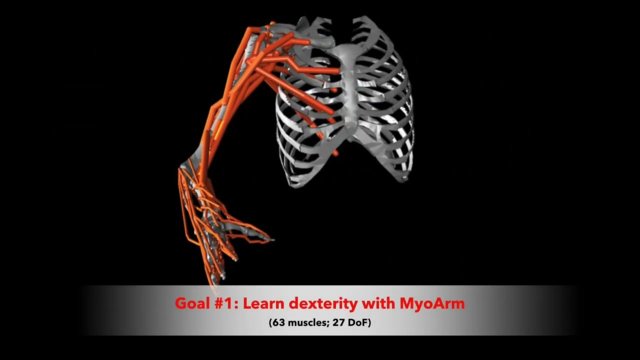Our body moves seemingly effortlessly, yet the way in which the brain controls our movements is still not well understood from a scientific perspective. This year, researchers from the Neuromechanical Modelling and Engineering Lab at the University of Twente, among others, are organising the MyoChallenge competition for the second time. In this challenge, scientists have to develop a digital version of the brain that precisely performs this task: controlling movements.
This 'brain' must, for example, be able to pick up objects or play tag as effectively as possible. These models utilise artificial intelligence and contribute to our understanding of how the nervous system controls our muscles, while also providing strategies for made-to-measure rehabilitation programmes for patients in the long run.
Picking up a block and pushing it through an appropriately sized hole into a box is something that people learn early in their lives. Most people also master the game of tag at an early age. But are these things child's play? Behind such seemingly simple tasks lies a complex collaboration between the brain and the muscles.
Take the hand, for instance, the most complex co-ordinating part of our body, with about thirty to forty muscles and different joints. "In this part of our body, there is a vast number of degrees of freedom, which means that there are different 'strategies' that the brain uses to make the hand perform a certain movement," says Massimo Sartori, professor and chair of the Department of Neuromechanical Engineering at the University of Twente. Through practice, our brain eventually finds the best way to perform a particular action, but this varies from person to person and also changes as someone gets older or, for example, sustains an injury.
Artificial Intelligence
Our knowledge of how the brain controls the body is still limited. According to Sartori, this is due to the differences between neuroscience and the field of biomechanics. "In essence, researchers from these fields speak different languages, which hinders their mutual understanding," he says. However, there is another rapidly developing field that could potentially bridge the gap: artificial intelligence. Just like our brains, artificial intelligence is particularly suited to finding solutions for complex problems with many degrees of freedom, such as controlling body movements.
This is precisely the direction in which the field of biomechanics is evolving. Sartori and his colleagues have developed a model of (parts of) the body that can be controlled by artificial intelligence. This software platform, MyoSuite, was created in collaboration with researchers from McGill University, Northeastern University, and MetaAI. The program serves as the playing field for the MyoChallenge, a competition for scientists attempting to control the biomechanical models in the program using artificial intelligence.
Child's play
Sartori and his colleagues are asking scientists who participate in the MyoChallenge to "design" a brain that, while limited in comparison with our own brains, is specialised in performing a particular task. The disciplines involved in the competition resemble games to some extent; for example, there is a model of an arm with a hand that grasps an object, such as a cube, and places it in a specific holder. Another discipline revolves around playing tag with a body whose legs are being controlled. "This model has around eighty different muscles and it is challenging to control, to make it walk and to turn it without falling over," says Sartori. "The goal is to chase an opponent within a twelve-by-twelve-meter arena. The fastest player wins." The MyoChallenge is part of the NeurIPS 2023 conference, which will take place in New Orleans in December 2023. This conference brings together many experts in the field of artificial intelligence. The winner of the competition will receive a prize of one thousand euros and will have the opportunity to present their experiences at the conference.
A digital clone for medical research
Of course, the development of such models is not just about creating a computer model that excels at playing tag. Firstly, these models will contribute to a fundamental understanding of how the brain controls our body. Additionally, there is the promise that they can also contribute to medical treatments. For example, the strategy for the rehabilitation of a patient who has suffered a stroke recently can be tested rapidly on a digital model of that patient. "Made-to-measure treatment in the first weeks following a stroke will lead to much better recovery of the patient," says Sartori.






